There’s nothing like the story of a boy and his dog (or girl and her dog) to touch the soul and warm even the coldest heart. That story and that emotion become even more powerful, however, when it helps show us history and humanity. And that’s exactly what writer/director Lynn Roth does with SHEPHERD: THE STORY OF A JEWISH DOG.
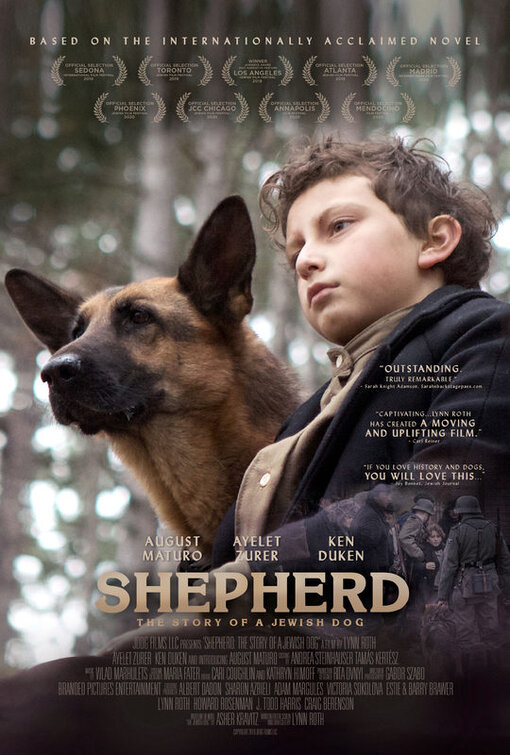
Adapted by Roth from the acclaimed book, The Jewish Dog, by Israeli author Asher Kravitz, SHEPHERD: THE STORY OF A JEWISH DOG gives us a new perspective on the Holocaust; an almost first-person account as seen through the eyes of a German Shepherd. A dog knows no religion, no race, no ethnicity. A dog only understands kindness and love no matter the source. And that is one of the biggest lessons to be learned from this story and this film.
We first meet Kaleb, one of the puppies born to the German Shepherd owned by 10-year old Joshua and his affluent Jewish family, in 1935 Germany. While all of the other puppies are given away, Joshua cannot bear to part with Kaleb. The two become inseparable and Kaleb becomes a beloved member of the family. But within the year, things change in every respect as we see throughout the town Jewish-owned businesses shuttered and those that remain open no longer willing to sell to Jews. And then comes the Nuremberg laws and the Nazi decree banning Jews from owning dogs, thus forcing Joshua’s father to give Kaleb away. Joshua is heartbroken as is Kaleb.
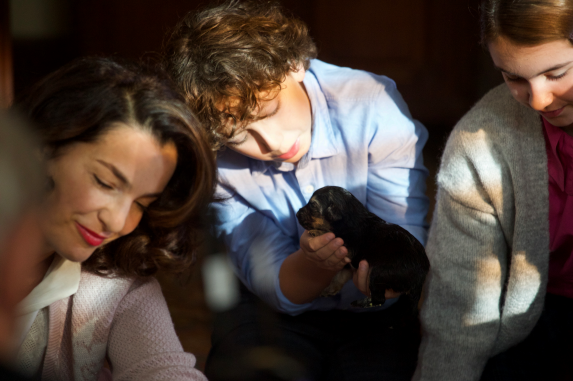
Handed off to a kind man and his less-than-kind wife, Kaleb runs away, making his way back to Joshua and his home. Only Joshua and his family are gone. Kaleb’s home is gone. Kaleb’s only recourse is to survive as a stray on the street. Survival for Kaleb and other strays with whom he has bonded is not easy as they seek shelter from the rain and the cold, scrounge for food, hide from would-be captors, and yet, they still find some lightness and joy as they run and romp.
All that changes for Kaleb when he is captured by animal control and turned over to the SS for training to help round up Jews. Luckily for Kaleb though, his handler is an officer named Peter who has great affection for the dog, Naming him “Blitzie”, the pair serve the SS so well as Blitzie helps to “sniff out” and round up Jews that they are assigned to a Jewish work camp to keep the prisoners in line. But what happens when a new trainload of prisoners arrives at the camp and Joshua steps out of the train. Will Kaleb/Blitzie remember or recognize Joshua? Will Joshua recognize his beloved Kaleb?
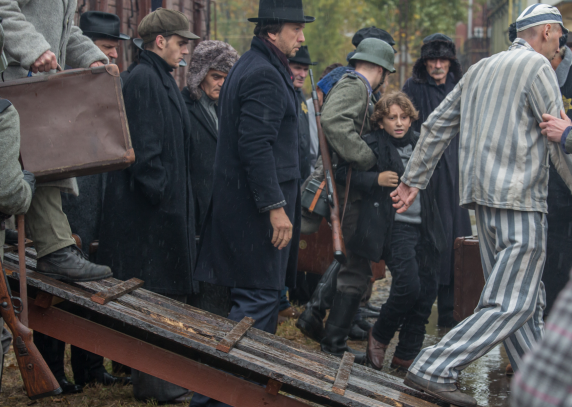
August Maturo stars as Joshua with five different dogs stepping in as Kaleb/Blitzie, each one as heart-melting as the next. Well familiar with Maturo from his tv work both on “Girl Meets World” and multiple television one-offs, his performance here as Joshua is off the charts. He wraps you around his little finger and never lets go. You feel every tear, every look of fear, every moment of joy when he is with Kaleb. August and Kaleb steal the show and melt your heart.
While showing Nazi heartlessness through supporting background players, Roth keenly calls upon Ken Duken to tackle the role of Peter, making this aspect of the story more palatable for families and younger viewers being exposed to the atrocities of the Nazi regime and the Holocaust for the first time. Duken walks a fine line as dedicated SS officer while showing us the softer side of Peter through his interactions and love for “Blitzie.”
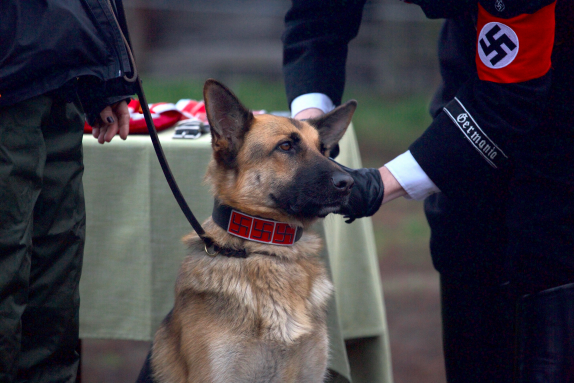
Already providing us with a solid script and three-dimensional (and four-pawed) characters guaranteed to touch us in some respect, key to the telling of this story is that Roth and her cinematographer Gabor Szabo keep the camera at dog eye level and kid eye level for the majority of the film. They really put us in their feet and paws, creating a deep connective tissue for the audience. Even scenes with Kaleb/Blitzie and adults, such as with Duken’s Peter, most of the scenes between man and dog have man sitting or kneeling with Blitzie. Young Joshua is always at eye level with Kaleb/Blitzie and even the heavy set local man with the nasty wife who first takes Kaleb, we are kept at eye level/furniture level, and with man and dog as man is seated or bent down. We stay in the POV of the dog and Joshua.
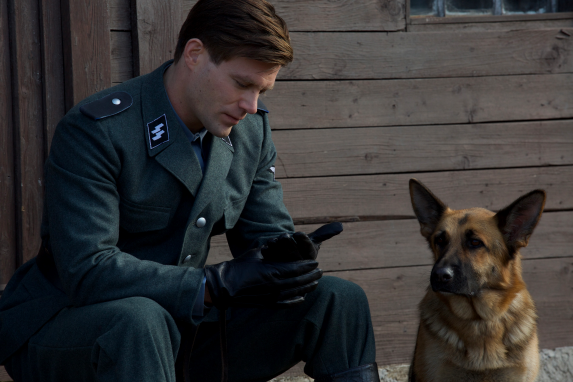
Beyond the camera angle POV, the cinematography is beautiful. We go from the sun-drenched tall windows in Joshua’s home to the intimacy of a Passover Seder. A colorful village captures the joy of Joshua, his family, and their friends. But then Szabo and Roth start stripping color away as the situation gets dire; Kaleb runs away and becomes a street dog, Joshua and his family disappear, and then Joshua reappears in a greyish-brown muted, color-stripped “work camp”. SS officers and offices are barren, bare, and tonally muted, allowing for pops of red (aka blood) to stand out in the uniforms or on Blitzie’s graduation collar. No fancy dutching to detract from the story or the heartfelt magic and/or heartbreak of Joshua and Kaleb. When Joshua and Kaleb escape the camp and take refuge with the Resistance, color returns in clothing and candlelit tables and cloth for tents and the camera returns to the intimacy of the family at the last shared Seder. Wonderful bookending.
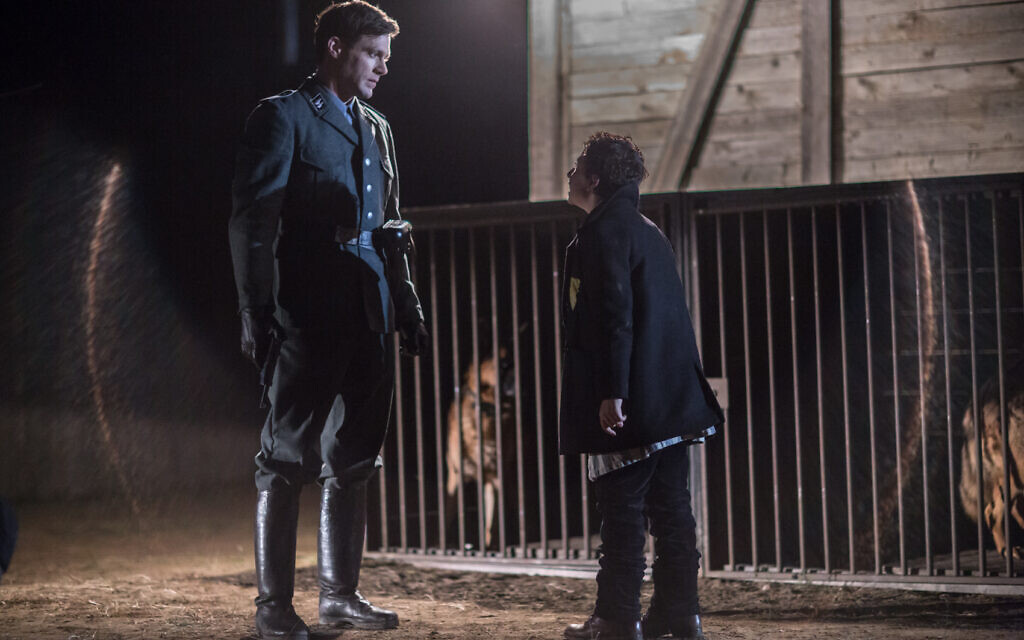
A standout is a sequence of an escaping Joshua in a boat with Kaleb jumping in the water swimming to him and saving him as Joshua can’t swim. As a boy and his dog are essentially saving each other, the camera opens wide to show the moon glistening on the water’s horizon is stunning; metaphoric and akin to a baptismal for Joshua and Kaleb with life is renewed, cleansing the horrors of the past.
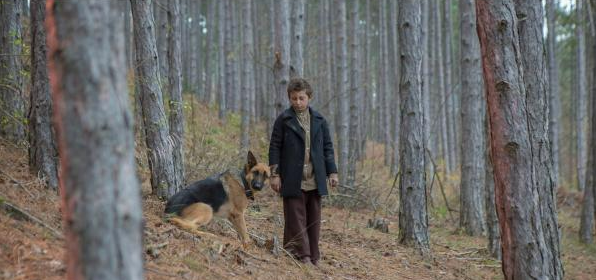
Adding to the emotionality of SHEPHERD: THE STORY OF A JEWISH DOG is the work of composer Wlad Marhulets with the score. Already with an impressive pedigree as providing additional music in multiple films, here he is sole composer. Marhulets shines not only in the composition by bringing in ethnic and religious notes where appropriate but in the musical arrangement and instrumentation. And he doesn’t forget to give us some lighter notes in happy times or when Kaleb is frolicking with his street dog pals.
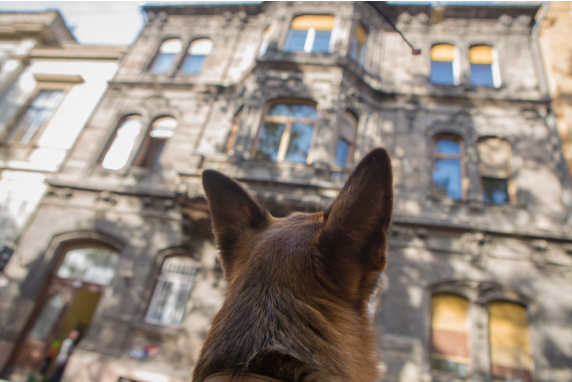
Opening our eyes to history by opening our hearts to the tale of a boy and his dog, SHEPHERD: THE STORY OF A JEWISH DOG has emotional resonance on every level, tugging at the heartstrings with enough warmth to melt even the coldest Nazi heart.
Written and Directed by Lynn Roth, based on the book The Jewish Dog by Asher Kravitz
Cast: August Maturo, Ken Duken, “Kaleb”
by debbie elias, 05/18/2021











